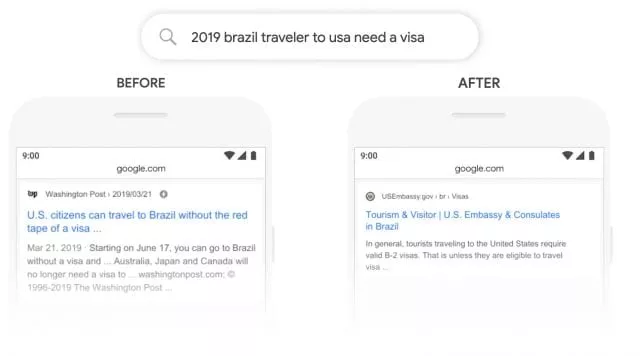On Oct. 25, 2019, Google announced an update that has been called the most important update in 5 years. The BERT update affects about 10% of all online searches within Google. But what exactly is BERT and how will it affect your SEO?
What exactly is BERT?
BERT stands for "Bidirectional Encoder Representations from Transformers" and helps the search engine better understand words in a sentence, making the search results better match the search query. With this, Google has open-sourced a natural language processing (NLP) pre-training technique. According to Google, this update affects complicated searches that depend on context.
Here's what Google said:
"These improvements are oriented around improving language understanding, particularly for more natural language/conversational queries, as BERT is able to help Search better understand the nuance and context of words in Searches and better match those queries with helpful results. Particularly for longer, more conversational queries, or searches where prepositions like "for" and "to" matter a lot to the meaning, Search will be able to understand the context of the words in your query. You can search in a way that feels natural for you."
What makes BERT different?
This new update/breakthrough is the result of research into transformers: artificial intelligence (AI) models that can see words in relation to all other words in a sentence rather than one at a time. These models can therefore consider the full context of a word by looking at the words that come before and after it, which is useful for understanding the intent behind searches and thereby showing search results that better match search intent.
Lots of technical details. But what does this all mean for you? By applying BERT models to both rankings and featured snippets, Google can do a much better job of helping users find useful information. When it comes to search results, BERT Search will help 1 in 10 searches be better understood. This mainly applies to long-tail searches or searches that use prepositions such as "for" or "at. Google Search will be able to contextualize the use of these words much better. It is therefore all the more important that you use content to help Google understand what your website is about.
What are the differences in the search results?
So Google's BERT update improves the way Google understands search queries. BERT analyzes search queries, not Web pages. An example from Google analyzes a search query where the differences are readily apparent. The search query is "2019 brazil traveler to usa need a visa".
Before the BERT update, results were shown that focused more on the first words in the search query so "2019 brazil." With the BERT update, Google better understands the search query where (Brazilian) travelers want to go to America. You can see the difference in the example below.

Rollout to other languages
Google says BERT is being applied to make Search better for people around the world. A powerful feature of the systems is that they can learn lessons from one language and apply them to others. So one can take models that learn from improvements in English and apply them to other languages. This helps Google better display relevant results in the many languages in which Search is offered.
For featured snippets, Google uses a BERT model to improve featured snippets in the countries where this feature is available, and there is talk of significant improvements in languages such as Korean, Hindi and Portuguese. So for the improvements in the Dutch language, we will have to wait a while.
Nevertheless, Google is still holding back and indicating in advance that even with BERT they will not always get it right. Understanding language remains an ongoing challenge and we are curious to see what it will bring to the Netherlands!
Want to know more about this update? Or do you need help with SEO or other issues? Then get in touch with us!